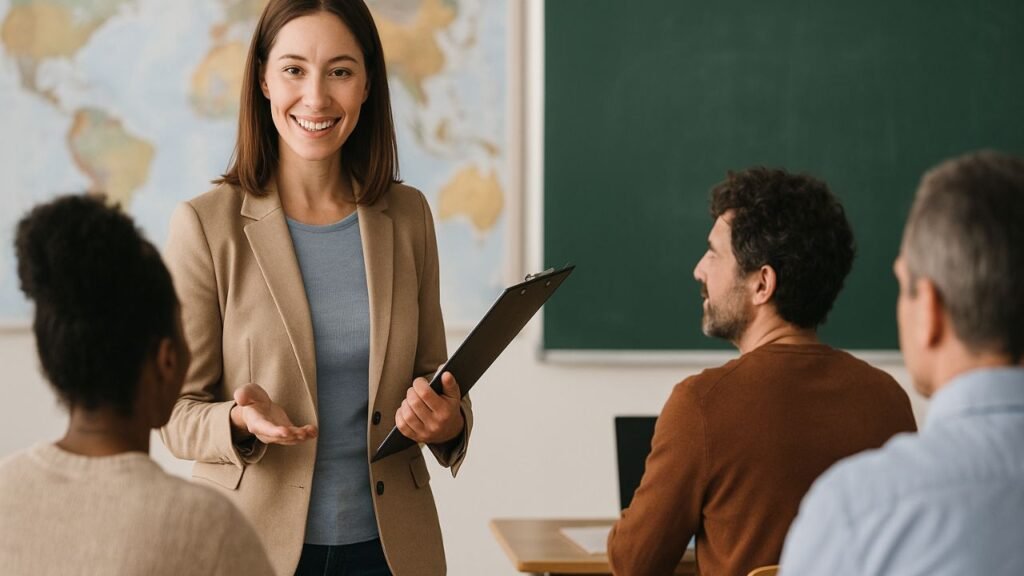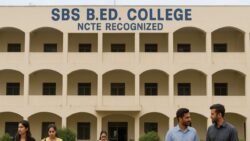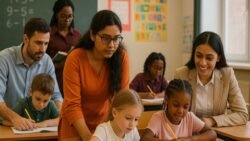Education Standards- In the evolving landscape of education, becoming a teacher with skills aligned to modern standards is essential for fostering meaningful learning experiences. Teachers today are expected not only to deliver content but also to engage students through innovative methodologies, digital tools, and inclusive teaching practices. Developing these competencies ensures that educators can address diverse learning needs and prepare students for the challenges of the 21st century. According to UNESCO – Education for Sustainable Development, teacher training programs that focus on pedagogical skills, classroom management, and digital literacy significantly enhance learning outcomes. Institutions like SBS B.Ed. College provide comprehensive programs emphasizing practical teaching experience, modern curriculum integration, and exposure to real classroom scenarios. Aspiring teachers benefit from structured mentorship, hands-on workshops, and interactive learning environments that mirror contemporary educational standards, equipping them to become effective, confident, and adaptive educators capable of shaping future generations.

Integrating Modern Pedagogy and Technology
One of the most important aspects of contemporary teacher training is the integration of modern pedagogy with technological tools. Innovative teaching methods, such as flipped classrooms, blended learning, and project-based learning, have been shown to improve student engagement and comprehension. According to Edutopia – Effective Teaching Strategies, teachers who incorporate technology in a pedagogically sound manner foster critical thinking, collaboration, and creativity among students. SBS B.Ed. programs focus on equipping teachers with skills to design interactive lesson plans, utilize digital resources, and manage online learning platforms effectively. By combining traditional teaching methods with digital tools, educators can create dynamic classrooms that cater to diverse learning styles. This approach ensures that teachers are prepared to navigate modern educational environments while maintaining high standards of academic excellence and student-centered learning, ultimately bridging the gap between conventional instruction and contemporary expectations.
Practical Training for Real-World Classrooms
Hands-on teaching experience is a cornerstone of preparing educators to meet today’s standards. Teacher training programs emphasize practical exposure through internships, classroom observations, and supervised teaching practice. According to NCERT – Teacher Education Programs, practical training helps educators develop classroom management skills, adapt lesson plans for diverse learners, and apply theoretical knowledge effectively. At SBS B.Ed. College, students participate in structured teaching practicum sessions that provide exposure to real classroom challenges and diverse student populations. This experience enhances problem-solving abilities, communication skills, and instructional strategies. By bridging theory and practice, aspiring teachers gain confidence in implementing curriculum objectives, engaging students meaningfully, and fostering a positive learning environment. Practical training ensures that educators are not only knowledgeable but also equipped to handle dynamic classroom scenarios with adaptability and professionalism.
Emphasizing Inclusive Education and Student-Centered Learning
Modern education standards emphasize inclusivity and a student-centered approach that recognizes individual learning needs. Teachers are trained to create equitable learning environments that support students with varying abilities, cultural backgrounds, and learning styles. According to UNICEF – Inclusive Education, adopting inclusive teaching practices enhances academic outcomes, social-emotional development, and overall classroom harmony. Programs at SBS B.Ed. College focus on equipping educators with strategies to differentiate instruction, utilize adaptive technologies, and promote active participation among all students. Emphasizing inclusivity ensures that every learner receives attention and support, fostering a culture of respect and collaboration. Teachers trained in student-centered methodologies are better prepared to identify learning gaps, provide personalized guidance, and cultivate critical thinking skills, aligning with the holistic goals of modern education systems and global teaching standards.
Continuous Professional Development and Lifelong Learning
Becoming a competent teacher in today’s educational environment requires commitment to continuous professional development. Engaging in workshops, seminars, certification programs, and reflective practice helps educators stay updated with emerging pedagogical trends, curriculum changes, and technological innovations. According to TeachThought – Teacher Professional Development, lifelong learning fosters adaptability, improves instructional quality, and enhances career growth. SBS B.Ed. College encourages graduates to pursue ongoing development opportunities through research projects, collaborative learning communities, and professional networks. By maintaining a culture of lifelong learning, teachers can consistently refine their skills, implement evidence-based practices, and remain responsive to evolving educational needs. Continuous professional growth ensures that educators contribute effectively to student achievement, institutional success, and the broader advancement of educational standards, establishing themselves as impactful leaders in their field.




